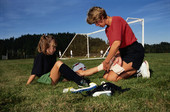- Could Your Grocery Store Meat Be Causing Recurring UTIs?
- Are You Making This Expensive Thermostat Error This Winter?
- Recognizing the Signs of Hypothyroidism
- 10 Strategies to Overcome Insomnia
- Could Artificial Sweeteners Be Aging the Brain Faster?
- Techniques for Soothing Your Nervous System
- Does the Water in Your House Smell Funny? Here’s Why
- Can a Daily Dose of Apple Cider Vinegar Actually Aid Weight Loss?
- 6 Health Beverages That Can Actually Spike Your Blood Sugar
- Treatment Options for Social Anxiety Disorder
Delaying Kid’s Knee Surgery Could Be a Bad Play, Study Finds


Delaying surgery to repair damage to the anterior cruciate ligament (ACL) — the main ligament in the middle of the knee — could increase a young athlete’s risk for further injuries, researchers report.
They analyzed the medical records of 130 patients, aged 8 to 16, who had ACL reconstruction surgery. Of those patients, 62 had surgery less than six weeks after their injury, 37 had surgery six to 12 weeks after, and the others had surgery more than three months after their injury.
The youngsters who had surgery later had higher rates of secondary knee injuries and more severe injuries, according to the study. Researchers presented the findings Thursday at the annual meeting of the American Orthopaedic Society for Sports Medicine in Seattle.
One common type of secondary knee injury is a meniscal tear. The meniscus is a rubbery disc that cushions the knee. The tear can occur on the outer side of the knee (lateral tear) or on the inner side of the knee (medial tear) when the knee is forcefully twisted or rotated.
“Patients who had surgery 6 to 12 weeks after ACL injury had 1.45 greater odds of lateral meniscus injury, and those waiting 3-plus months increased their risk 2.82 times,” lead author Dr. Allen Anderson, of the Tennessee Orthopaedic Alliance in Nashville, said in a society news release. “The risk for medial meniscal tears was 4.3 times greater when delaying surgery at least 6 weeks.”
About two-thirds of the study patients were male. Other risk factors for secondary knee injuries included younger age, returning to sports before ACL surgery and previous knee instability, the study authors noted.
“While parents and other caregivers have obvious reasons for concern over ACL surgery in young patients, it’s important to recognize when it may be beneficial,” Anderson said. “If surgery now helps eliminate long-term knee problems, it’s certainly a good choice.”
Data and conclusions presented at meetings are typically considered preliminary until published in a peer-reviewed medical journal.
More information
The U.S. National Library of Medicine has more about anterior cruciate ligament injury.
Source: HealthDay
Copyright © 2026 HealthDay. All rights reserved.










